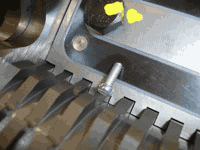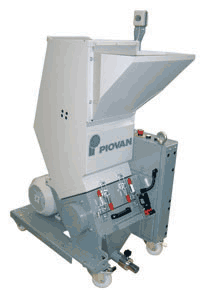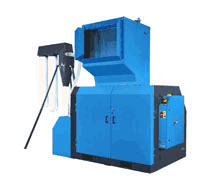Rapid's IMD function automatically stops granulator operation if metal enters machine. Piovan RSP20 granulator guarantees powder-less regrind.
October 21, 2008
|
The days of discarding sprues, runners and rejects are over. Nowadays processors treat any plastic material as if it were as valuable as platinum, and the emphasis is on recovering what's possible in as efficient a manner as possible. Fortunately, equipment suppliers are coming to the fore with low-maintenance, reliable solutions that maximize uptime and productivity, and supply high regrind quality.
The new MGL2 Series of granulators from Matsui Mfg (Osaka, Japan), for example, is said to feature greater ease in both cleaning and maintenance, and enhanced reliability. Cleaning is made easier in this series of low-speed granulators as users can open the chamber to an angle of 138°. In addition, a pivot link mechanism allows the housings to be opened in a single action, and no tools are required for cleaning.
Further, a double bearing structure reduces the burden on the shaft and a built-in anti-vibration torque arm protects the shaft and reduction gear. Equipment life span is said to be extended 1.5-fold compared to Matsui's previous MGL series. Matsui also offers the MGL2-TPE dedicated to grinding of elastomers that minimize bad cuts, prevents formation of powder and ensures stable regrind grain size.
Furthermore, the Japanese equipment vendor also offers a cost-effective granulation solution in the form of the compact, easy-cleaning (one-touch opening) 0.5-HP SMGL-050A, which is made in China. The unit is specifically designed for sprues / runners discharged from injection machines of 50 tonnes' clamping force and less.
Also highlighting cost performance, Wittmann (Vienna, Austria) says its new MAS Series of beside-the-press, compact granulators is priced approximately 20% lower than its MB Series, due primarily to design for efficient manufacturing and taking advantage of its multiple manufacturing facilities throughout the world. Bob Harrison, regional manager for granulators at Wittmann USA (Torrington, CN) adds that rotor speed has also been reduced, and an optimally designed cutting geometry, featuring both open and staggered rotors, realizes high cutting angles for an efficient scissor-type cutting action.
Further, no tools are required for access for cleanout between color and/or material changes, and a safety interlock for both the hopper and the regrind collection bin is also included. Harrison adds, “No adjustment is required for MAS 1 and MAS 3 with staggered rotor and 4-sided (cutting edges) stationary knives, while a knife gap pre-adjustment fixture standard for MAS 2 and MAS 4 with open rotor.”
In addition, replaceable inserts on the sidewalls of the cutting chamber prevent material wrapping between rotor and sidewalls and a high level indicator (with audible and visual alarm) is optional for the regrind collection bin, which does not have to be removed to access the bin. An optional clamshell sound enclosure for sound levels below 80 db for most types of materials is also offered, as is an optional additional flywheel for thicker parts and an optional water-cooling jacket for the cutting chamber to help prevent thermal degradation.
Versatility and robustness are the main characteristics of the RSP20 granulator from Piovan (Venezia, Italy). The design of the rotor is said to realize very high quality regrind with the lowest energy utilization. Maintenance and cleaning are also quick and safe for the operator. The open-type rotor, featuring low speed rotation, no overheating, inclined blades, precise cut and stainless steel screen, ensures high quality and powder-less regrind. Further, the rotor shaft is equipped with side rotating disks at both ends that prevent the regrind from suffering friction stress. The progressive cutting action of the rotor coupled with the sound proofing cover of the feed hopper guarantee noise levels below 80 dB.
The Piovan hopper design allows manual feeding as well as feeding from robot or conveyor belt. The large feed port facilitates the entrance of big parts and prevents return of material to grind. Regrind evacuation can be obtained in four different manners - direct evacuation, inclined extraction auger, blower and cyclone receiver or floor stand for free fall.
Optionally, the RSP20 series can be equipped with a visual alarm, a regrind collection box, regrind collection box with rotating level sensor, a feeding funnel for robots, a fly-wheel, a nitrated cutting chamber and an adjust pattern for the rotor blades.
Taiwan's Shini Plastics Technologies (Taipei) recently introduces its SG-50 series granulators that possess an optional cutting chamber with reversible back plate. The back plate is normally positioned with two fixed knives facing the cutting chamber, which offers a wider in-feed opening that allows bulky thin-walled parts to be immediately pulled into the knives, and higher capacities on account of single-stage cutting. If granulation of thick-walled parts, heavy-duty film and sheet or profiles is required, the back plate can be rotated with a tool to have three fixed knives facing the cutting chamber for lower capacity, two-stage cutting.
Rotogran (Concord, ON) offers a new option for abrasion resistance in its granulators. The supplier has designed a system whereby the wear areas of the granulator chamber are fitted with removable inserts. These inserts can be replaced while the rotor is installed and without disassembling the entire granulator chamber. This operation can be performed in less time than a typical blade change. Inserts are located at both sides of the rotor and at the wear point of the back plate leading into the bottom stationary blade area. Inserts can be provided as is without any protective coating for use as a consumable product, or they can be tungsten carbide coated. Typical hardness of the tungsten coating is 65 Rockwell C.
Tria (Cologno Monzese, Italy), meanwhile, reports positive feedback for its new MINI - MAXI series dedicated to injection molding applications. The manufacturers claims these offer 30% lower energy consumption and 25% smaller dimensions than competing products.
Rapid (Bredaryd, Sweden) has debuted its new 100-series of slow-speed (screenless) granulators featuring IMD (Integrated Metal Detection) for beside the press applications dedicated to hard and brittle materials such as glass-filled compounds. The portfolio comprises eight base models from the smallest for tiny sprues from gear production, for example, to very large components like car bumpers and dashboards. All machines are equipped with “soft coupling” in order to absorb operational stress and prevent damage to gearbox and motor. The IMD function automatically stops the granulator when metals enter.
Rapid has also launched its largest ever “open-hearted” concept granulator with the 600-series, featuring rotor diameter of 600 mm and three widths of 900, 1200 and 1500 mm. The series can handle capacities up to 2500 kg/hr. The 600-series can also be equipped with the Rapid Super tangential cutter house which enables a user to run bigger parts than the actual rotor diameter.
Contact Information
Matsui www.matsui-mfg.net
Piovanwww.piovan.com
Rapid Granulatorwww.rapidgranulator.se
Rotogranwww.rotogran.com
Triawww.tria.it
Wittmannwww.wittmann-ct.com
You May Also Like





